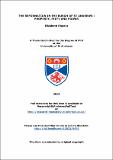The Reformation in the burgh of St Andrews : property, piety and power
Abstract
This thesis examines the impact of the Reformation on the estates of ecclesiastical
institutions and officials based in St Andrews. It argues that land and wealth were
redistributed and power structures torn apart, as St Andrews changed from Scotland’s
Catholic ecclesiastical capital to a conspicuously Protestant burgh. The rapid dispersal
of the pre-Reformation church’s considerable ecclesiastical lands and revenues had
long-term ramifications for the lives of local householders, for relations between
religious and secular authorities, and for St Andrews’ viability as an urban community.
Yet this major redistribution of wealth has had limited attention from scholars.
The first part of this study considers the role played by the Catholic Church in St
Andrews before the Reformation, and the means by which it was financed, examining
the funding of the city’s pre-Reformation ecclesiastical foundations and officials, and
arguing that (contrary to some traditional assumptions) the Catholic Church in St
Andrews was on a reasonably sound financial footing until the Reformation. The second
section considers the immediate disruption to St Andrews’ religious lands and revenues
caused by the burgh’s public conversion to Protestantism, and then explores the more
planned reorganisation of the 1560s. The disputes and difficulties triggered by the
redistribution of ecclesiastical wealth are examined, as well as the longer term impact
on St Andrews of the treatment of church revenues at the Reformation. Evidence for this
study is chiefly drawn from the extensive body of manuscripts concerning St Andrews
held by the National Library of Scotland, the National Records of Scotland, and the
University of St Andrews Special Collections.
Type
Thesis, PhD Doctor of Philosophy
Collections
Items in the St Andrews Research Repository are protected by copyright, with all rights reserved, unless otherwise indicated.

